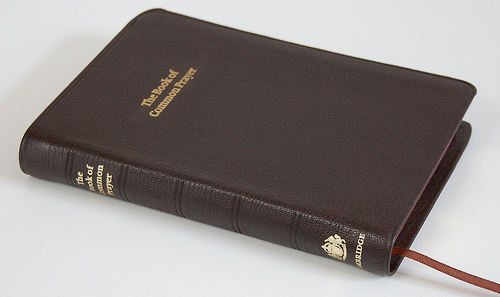 To my joy, in Morning Prayer at Trinity College this week we're using the Church of England's 17th Century Book of Common Prayer. It's not that I don't appreciate the updated mainstay, the 21st century book of Common Worship--I like that too--but I love the BCP.
To my joy, in Morning Prayer at Trinity College this week we're using the Church of England's 17th Century Book of Common Prayer. It's not that I don't appreciate the updated mainstay, the 21st century book of Common Worship--I like that too--but I love the BCP.This is what we used for morning prayers at King's College while I was studying in Aberdeen--when I was learning to make communal liturgy a central part of my daily life--so there is a degree to which the BCP simply holds significance of continuity for me. But it's more than that. The words and prayers are particularly rich.
Not just because they are in old English. To be honest that really doesn't do that much for me. I remember the KJV from my earliest years, but I was largely brought up on (and sometimes had to fight for) the NIV, so there's little nostalgia-factor in the thees and thous.
Don't get me wrong, there is something sometimes important about conforming one's prayers to the language of people long gone--but saying things like Sabaoth and Cherubin and which art in heaven are not the only reason I like the Book of Common Prayer.
No, for me it's just that there's a series of wonderful lines that are so significant I find myself actually looking forward to them. This week I'd like to highlight a few of the words I find myself hanging on, beginning with the simplest of them all:
world without end
This comes as part of the recurring Gloria Patri, which says in full:
Glory be to the Father,
and to the Son,
and to the Holy Ghost;
as it was in the beginning,
is now, and ever shall be,
world without end. Amen.
This is always a highlight of morning prayer. We say it all together, some with the sign of the cross, and it makes an important declaration for the day.
The refrain is familiar enough in other contexts as well, including Common Worship where it says 'Glory to the Father and to the Son and to the Holy Spirit; as it was in the beginning is now and shall be for ever. Amen.'
Clearly the BCP version is not much different--except for these three unique aspects:
- The first time it is said is typically call and response, with the leader calling us to worship with the first part, and the congregation joining in for the remainder;
- it says 'Glory be' rather than simply 'Glory', which makes it feel like a confession befitting any emotional state one might be in on any given day; and
- it ends with those three evocative words which are everlasting in scope but no less creaturely and profound. They call me to look forward with hope, not to escape into an ethereal 'plan B', but into Emmanuel's fulfilment of the Creator's plan A.
1 comment:
Great. Funny how things work. I'd been reading a book which talks about the common book of prayer (1979) so I went out and ordered one. Now you're writing about it.
hope your family is enjoying your new world over there.
Brett Gitzel
Post a Comment